Looking for a natural solution to oily skin? Here's why using oil might be the best thing you can do – and how to use it the right way.
It may seem counterintuitive, but when your skin feels greasy and shiny, it’s not necessarily because there’s too much oil. It may be a sign of imbalance – your skin might be trying to compensate. That’s where skincare oils like argan and jojoba can help restore calm and balance.
Can Oil Really Make Skin Less Oily?
It might sound contradictory, but natural skincare oils can actually help oily skin settle down. When we strip away the skin’s natural oils with harsh cleansers, it often responds by producing even more sebum to compensate.
The result? Skin that feels even oilier and prone to breakouts.
By instead applying gentle, nourishing oils, you signal to your skin that it doesn’t need to overproduce. It gets the moisture and protection it needs – leading to calmer, more balanced skin over time.
Why Oil Works for Oily Skin
- Skincare oils help protect your skin’s barrier, so it doesn’t lose moisture or become overloaded
- The right oil soothes and nourishes without clogging pores
- Oily skin can actually be dehydrated skin in need of hydration – not drying
Our Top Oils for Oily Skin
We recommend our organic argan oil – light, fast-absorbing, and ideal for oily and combination skin. It can be used alone or under a light cream.
Our organic jojoba oil is another favorite – a balancing oil that mimics your skin’s own sebum. It helps regulate oil production and is especially suited for combination or sensitive skin.
Skip the Harsh Stuff – Gentle Skincare Wins Long Term
Many with oily skin choose products that claim to “remove all oil.” The problem is, they often contain sulfates or drying alcohols that strip everything – even the good.
Check your ingredient list and avoid products with:
- Sodium lauryl sulfate (SLS)
- SD alcohol, denatured alcohol, or isopropyl alcohol
These might work short-term, but in the long run, they stress the skin and increase oil production.
Instead, we recommend using oil both as a cleanser and as nourishing moisture care after cleansing.
Why You Shouldn’t Cleanse with Water Alone
It might seem natural to wash your face with water – but it can often do more harm than good. Water doesn’t cleanse on its own, and using products that require a lot of rinsing can dry out your skin. The result? Redness, tightness, and increased sebum production as your skin tries to protect itself.
Instead, we recommend using oils both as a gentle cleansing solution and as nourishing moisture care after cleansing. Oils dissolve oils – supporting your skin’s natural pH and microbiome, and leaving it clean, calm, and balanced.
How to Use Oil in Your Routine
- Cleanse with apricot kernel oil: Our apricot kernel oil dissolves makeup, SPF, and dirt – without disrupting your skin's barrier or pH. Spray 2–3 pumps into your hands and massage gently. Then remove with a soft cotton cloth. Repeat if wearing heavy makeup.
- Apply a nourishing oil: While skin is still slightly damp, apply a few drops of argan or jojoba oil to help retain moisture and support skin balance.
Skincare with Oils: Pure Support
The most important thing you can do for your skin is listen to it. If it feels oily, tight, or prone to breakouts, it might actually be asking for moisture and calm – not harsher treatments.
By choosing natural oils as part of your daily routine, you’re supporting your skin rather than fighting it. Cleanse gently with almond oil, then nourish with balancing oils like argan and jojoba – both help strengthen the barrier and regulate oil production.
We offer organic argan oil, jojoba oil, and apricot kernel oil – carefully selected for their purity and their proven benefits for oily and combination skin.

